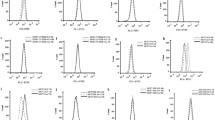Abstract
Background: P-glycoprotein (Pgp), a 170-kDa adenosine triphosphate-dependent membrane drug-efflux pump encoded by themdr1 gene, mediates cross-resistance in tumor cells to structurally unrelated cancer drugs. We investigated the capacity for modulating multidrug resistance by selectively inhibiting synthesis of Pgp using an antisense oligodeoxynucleotide complementary to the initiation codon ofmdr1 messenger RNA.
Methods: By continuous culture of K562 in 100 nM vincristine, a resistant cell line, K562/VCR100, was derived with high expression of Pgp (95.9% of cells) and an IC50 40-fold greater than that of the parental cell line. The K562/VCR100 cells were treated with 10 µM of 15-mer antisense and sense phosphorothioate oligodeoxynucleotides. Modulation of multidrug resistance was analyzed using a daunorubicin/tritiated thymidine incorporation assay and flow cytometric assessment of cellular rhodamine 123 accumulation.
Results: Treatment of K562/VCR100 with the antisense oligodeoxynucleotide led to a doubling in daunorubicin growth inhibition at 1 µg/ml and a tripling of growth inhibition at 0.6 µg/ml (p<0.0023); a 58% reduction in the daunorubicin IC50 (p<0.02); and an increased rate of rhodamine-123 accumulation (p=0.02) compared with treatment with sense oligodeoxynucleotide or media controls.
Conclusions: These results suggest that antisense oligodeoxynucleotides may serve as a useful adjunct in the treatment and prevention of multidrug resistance during cancer chamotherapy.
Similar content being viewed by others
References
Ueda K, Cornwell MM, Gottesman MM, et al. The mdrl gene responsible for multidrug resistance codes for p-glycoprotein.Biochem Biophys Res Commun 1986;141:956.
Gottesman MM. How cancers evade chemotherapy.Proc Am Assoc Cancer Res 1992;33:562.
Fojo AT, Ueda K, Slamon DJ, et al. Expression of a multidrug resistance gene in human tumors and tissues.Proc Natl Acad Sci U S A 1987;84:265.
Goldstein LJ, Galski H, Fojo A, et al. Expression of a multidrug resistance gene in human cancers.J Natl Cancer Inst 1989;81:116.
Fojo AT, Shen DW, Mickley LQ, et al. Intrinsic drug resistance in human kidney cancer is associated with expression of a human multidrug-resistance gene.J Clin Oncol 1987;5:1922.
Gerlach JH, Bell DR, Karakousis C, et al. P-glycoprotein in human sarcoma: evidence for multidrug resistance.J Clin Oncol 1987;5:1452.
Bell DR, Gerlach JH, Kartner N, et al. Detection of p-glycoprotein in ovarian cancer: a molecular marker associated with multidrug resistance.Clin Oncol 1985;3:311.
Chan HSL, Thorner PS, Haddad G, et al. Immunohistochemical detection of p-glycoprotein: prognostic correlation in soft tissue sarcoma of childhood.J Clin Oncol 1990;8:689.
Chan HSL, Haddad G, Thorner PS, et al. P-glycoprotein expression as a predictor of the outcome of therapy for neuroblastoma.N Engl J Med 1991;325:1608.
Sola JE, Wojno KJ, Dooley W, et al. P-glycoprotein status of favorable histology Wilms’ tumor preducts treatment outcome.J Pediatr Surg 1994;29:1.
Marie JP, Zittoun R, Sikic BI. Multidrug resistance (mdr1) gene expression in adult acute leukemias: correlations with treatment outcome and in vitro drug sensitivity.Blood 1991;78:586.
Yahanda AM, Adler KM, Fisher GA, et al. Phase I trial of etoposide with cyclosporine as a modulator of multidrug resistance.J Clin Oncol 1992;10:1624.
Cohen JS, ed.Oligonucleotides. Antisense inhibitors of gene expression. London: Macmillan, 1989.
Tapiero H, Munck JN, Fourcade A, et al. Cross-resistance to rhodamine 123 in adriamycin and daunorubicin resistant Friend leukemia cell variants.Cancer Res 1984;44:5544.
Efferth T, Lohrke H, Volm M. Reciprocal correlation between expression of p-glycoprotein and accumulation of rhodamine 123 in human tumors.Anticancer Res 1989;9:1633.
Ravviv Y, Pollard HB, Bruggemann EP, et al. Photosensitized labeling of a functional multidrug transporter in living drug-resistant tumor cells.J Biol Chem 1990;265:3975.
Wickstrom EL, Bacon TA, Gonzalez A, et al. Human promyelocytic leukemia HL-60 cell proliferation and c-myc protein expression are inhibited by an antisense pentadecadeoxynucleotide targeted against c-myc RNA.Proc Natl Acad Sci U S A 1988;85:1028.
Becker D, Meier CB, Herlyn M. Proliferation of human malignant melanomas is inhibited by antisense oligodeoxynucleotides targeted against basic fibroblast growth factor.EMBO J 1989;8:3685.
Gao WY, Hanes RN, Vazquez-Padua MA, et al. Inhibition of herpes simplex virus type 2 growth by bphosphorothioate oligodeoxynucleotides.Antimicrob Agents Chemother 1990;34:808.
Stein CA, Matsukura M, Subasinghe C, et al. Phosphorothioate oligodeoxynucleotides are potent sequence nonspecific inhibitors of de novo infection by HIV.AIDS Res Hum Retroviruses 1989;5:639.
Sarin PS, Agrawal S, Civeira MP, et al. Inhibition of acquired immunodeficiency syndrome virus by oligodeoxynucleoside methylphosphonates.Proc Natl Acad Sci U S A 1988;85:7448.
Loke SL, Stein CA, Zhang XH, et al. Characterization of oligonucleotide transport into living cells.Proc Natl Acad Sci U S A 1989;86:3474.
Cohen JS. Biochemical therapy: Antisense compounds. In: DeVita VT Jr, Hellman S, Rosenberg SA, eds.Biologic therapy of cancer. Philadelphia, PA: JB Lippincott, 1990:763–75.
Author information
Authors and Affiliations
Rights and permissions
About this article
Cite this article
Sola, J.E., Colombani, P.M. Modulation of multidrug resistance with antisense oligodeoxynucleotide to mdr1 mRNA. Annals of Surgical Oncology 3, 80–85 (1996). https://doi.org/10.1007/BF02409056
Accepted:
Issue Date:
DOI: https://doi.org/10.1007/BF02409056




